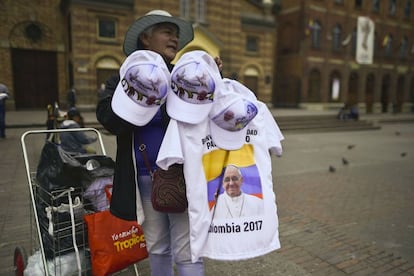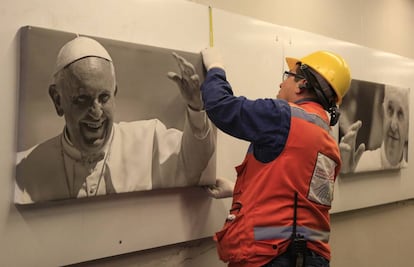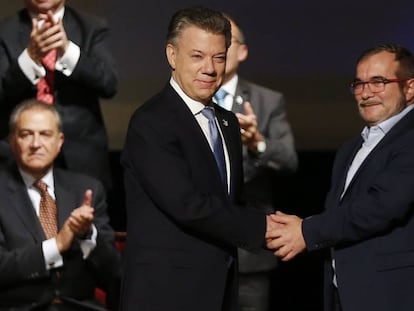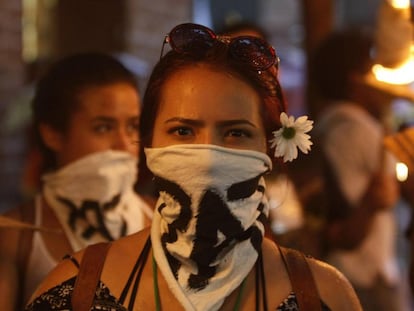With Colombia visit, Pope Francis hopes to help national reconciliation
Pontiff will visit four cities but will not meet privately with FARC or Venezuelan dissidents

When Jorge Mario Bergoglio became the new pope, he underscored that his own origins lay on the other side of the world (in Argentina) and that his priorities would lie with the people living on the social, geographical and political fringes of the planet.

Now, for his 20th trip as Pope Francis, he is returning to the Americas, where he will be visiting a country that represents his goals like few others: Colombia. The trip will seek to show support for national reconciliation, encourage the fight against poverty, and highlight environmental issues.
There is enormous expectation surrounding the four-day visit, which begins on Wednesday. The pope is playing on his home turf, and not just because he will be able to speak Spanish to the millions of faithful who await him. Pope Francis is going to one of the most deeply Catholic countries in the world, a place where 45 million people have been baptized and where the Catholic Church still plays a relevant religious and institutional role that it has lost elsewhere.
Both the Vatican and Colombian authorities insist that the trip will be ecclesiastical in nature. But the fact is that the country is currently a crossroads of Latin American policy, a fact that will force the pontiff to make more or less overt references to the FARC guerrilla and to the crisis in neighboring Venezuela.
We sent letters to His Holiness asking him to support the peace efforts in Colombia. He very kindly replied
Iv¨¢n M¨¢rquez, a FARC leader
When President Juan Manuel Santos announced the pope¡¯s visit last March, he made it clear that Jorge Mario Bergoglio would come ¡°to support Colombians in their peace-building.¡± Many viewed this move as a way to legitimize the president¡¯s own peace accords, which have been opposed by a section of Colombian society ¨C most notably former president ?lvaro Uribe.
The Vatican has strongly rejected the notion that the pontiff is taking sides, and asks simply that people ¡°listen to the pope.¡± But in a video message of his own, Francis went further: ¡°You always need to take a first step in any project,¡± he said. ¡°Peace is what Colombia has been seeking for a long time, and is working to achieve. Stable, long lasting. In order to see and treat one another as brothers, not as enemies.¡±
And via a message posted on Twitter, the pontiff stated that the goal of his trip is ¡°the search for reconciliation and peace in that country.¡±

Colombia is going through an unprecedented transition that still needs to overcome a major hurdle in the form of tremendous social polarization. The peace process with the FARC, the oldest guerrilla group in the Americas, has officially ended an armed conflict with the Colombian state that had dragged on for over half a century. But the way it was handled has widened the gap between supporters and detractors of the deal.
The war against the insurgency (which left a trail of 220,000 deaths and six million displaced people), paramilitary groups, drug trafficking and inequality have turned Colombia into a country of victims and killers. Reconciliation between citizens and between politicians is still a faraway goal.
This backdrop has fueled all sorts of expectations with regard to the pope¡¯s messages. The pontiff will begin his visit in Bogot¨¢ and end it in Cartagena de Indias, and his agenda includes a prayer meeting in Villavicencio on Thursday with victims of violence, former guerrilla fighters, members of the military and police officers. Pope Francis will also go to Medell¨ªn, the city made infamous by the drug trafficker Pablo Escobar, where authorities expect a crowd of nearly a million people to turn up.
Colombia ranks seventh on the list of countries with the largest Catholic communities. The Church has traditionally supported conservative views, and at a referendum held last year seeking support for the peace accords, it helped push the vote against the deal. Yet even former FARC leaders are celebrating Francis¡¯s visit. ¡°We sent letters to His Holiness asking him to support the peace efforts in Colombia. He very kindly replied,¡± says Iv¨¢n M¨¢rquez, the number-two man at FARC, which has just created a political party.
The Vatican has strongly rejected the notion that the pontiff is taking sides, and asks simply that people ¡°listen to the pope¡±
FARC leaders also requested a private meeting with the pope, although this will not be taking place. The Vatican has also ruled out the possibility that Francis might meet privately with Venezuelan dissidents or even with bishops from that country, despite rumors to the contrary.
However, the deep institutional crisis affecting Venezuela will be an indirect presence during Pope Francis¡¯s trip, which comes 31 years after a visit by another pontiff, John Paul II.
English version by Susana Urra.
Tu suscripci¨®n se est¨¢ usando en otro dispositivo
?Quieres a?adir otro usuario a tu suscripci¨®n?
Si contin¨²as leyendo en este dispositivo, no se podr¨¢ leer en el otro.
FlechaTu suscripci¨®n se est¨¢ usando en otro dispositivo y solo puedes acceder a EL PA?S desde un dispositivo a la vez.
Si quieres compartir tu cuenta, cambia tu suscripci¨®n a la modalidad Premium, as¨ª podr¨¢s a?adir otro usuario. Cada uno acceder¨¢ con su propia cuenta de email, lo que os permitir¨¢ personalizar vuestra experiencia en EL PA?S.
?Tienes una suscripci¨®n de empresa? Accede aqu¨ª para contratar m¨¢s cuentas.
En el caso de no saber qui¨¦n est¨¢ usando tu cuenta, te recomendamos cambiar tu contrase?a aqu¨ª.
Si decides continuar compartiendo tu cuenta, este mensaje se mostrar¨¢ en tu dispositivo y en el de la otra persona que est¨¢ usando tu cuenta de forma indefinida, afectando a tu experiencia de lectura. Puedes consultar aqu¨ª los t¨¦rminos y condiciones de la suscripci¨®n digital.










































